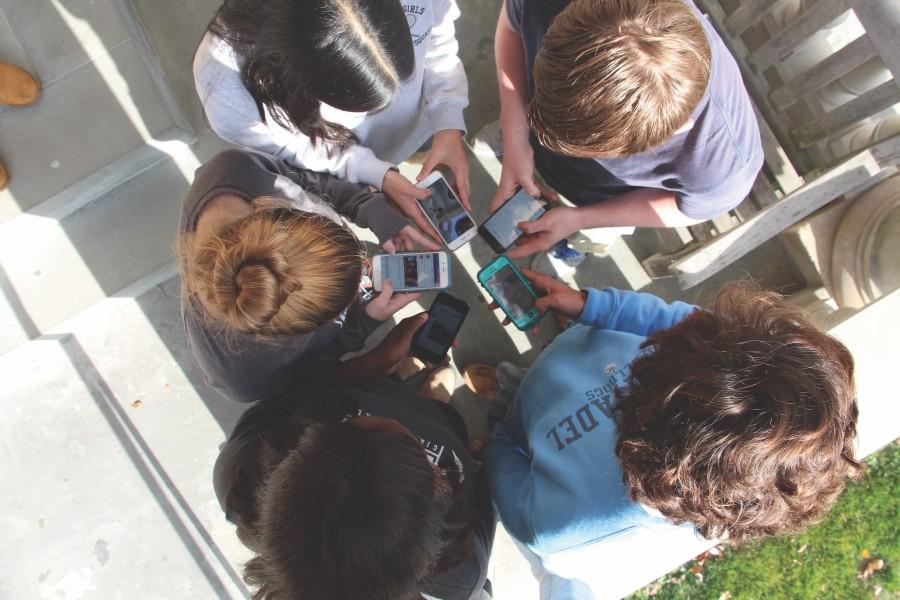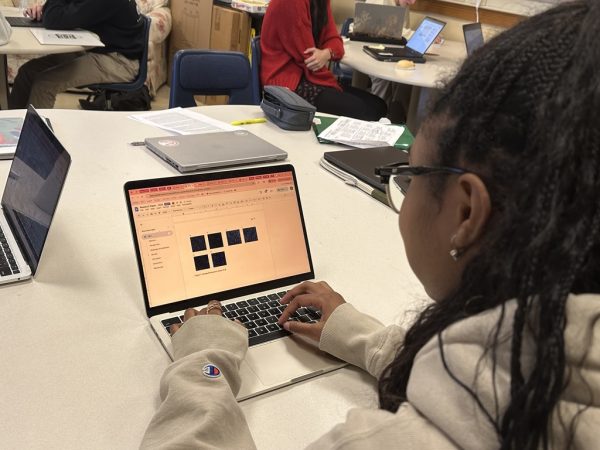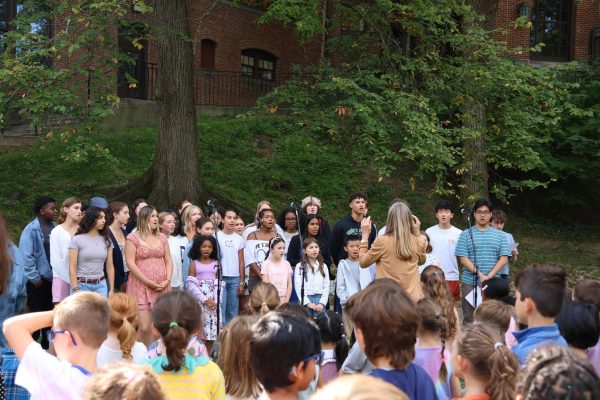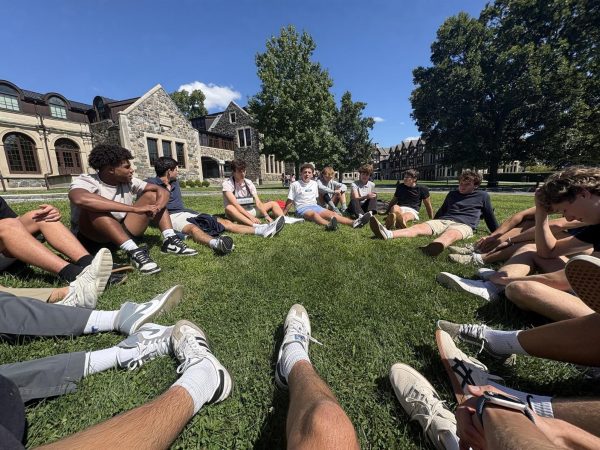Social Media Shapes New Era for Teens
We Hate that we Love it
Credit: Robert Hallock
A typical sight to see amongst today’s teens: a laser focus on technology rather than in-person contact.
We all know the drill. Get home, grab a snack, check your phone. Eat dinner, do homework, check your phone. It is now a second nature for people to be constantly connected online. Whether it be Instagram, Facebook, Twitter or Tumblr, social media is all-consuming.
Teenagers are especially attached to the virtual world, undeniably affecting their day to day experiences. As more and more apps hit the shelves that are designed to encourage interaction, teenagers receive additional pressure from their “friends” or “followers” to fit in and change the way they express themselves according to what these people “like”.
As the modern teen’s daily routine becomes more impacted by social media, some consider it to be an obsession, and what causes the lack of productivity that exists within this “online” generation. According to a study of 102 students at Johnson & Wales University, 57% of students stated that social media has made them less productive. “It is a big part of my life…the rise of social media has taken over a lot of my down time,” said freshman Maddie White.
Furthermore, a study by Ohio State University concluded that college students who use Facebook spend less time on studying and have lower grades than those who do not use social media. Similar time constraints affect Hackley students as well. “Iit encompasses my life and just about everyone else’s lives growing up in our generation a lot, and probably more than it should,” said senior Kelly Saxton.
Sophomore Grace Rubin agreed with Kelly’s statement in a more positive manner. “It is not a major part but I like that it can capture the important moments in my life and the exciting things and I can look back on them and be all nostalgic and be like ‘aww I remember that,” said Grace.
Anthony Wagner of Stanford University researched such mental responses to posts on social media. “Each time we get a message of text, our dopamine reward circuits probably get activated since the desire for social connection is so wired into us,” Wagner stated.
People also create routines for themselves in social media, using specific patterns on when and what they post to ensure the best possible response. “I post pictures with people so then if someone looks at my profile they will be like ‘oh, he has friends.’ And then I guess kind of just showing who you are through those photos,” said sophomore Eli Hankin.
Students also reported a pressure to post their most positive selves online.“I want to seem fun, I don’t want to be one of those people who always look depressed looking out the window, I want for it to seem like I do exciting things,” said sophomore Grace Rubin.
Many students dedicate a lot of time to their social media to create an overall theme or aesthetic. They genuinely want their followers to like what they post. For many people, likes are an obsession – they need likes in order to build self esteem or even create an affirmation of popularity. “It’s all about the likes,” said sophomore Michael Mezzacappa.
“I think that ‘likes’ are a big part of the social media hype, because whenever you get a ‘like’ you’re getting approval from people for whatever you’re posting,” said Kelly.
These “likes,” or lack thereof can influence the self-esteem of a teen greatly. “I don’t want to say I care, but I do kind of care. If I think that a photo is really cute and then it doesn’t get as many likes as I usually get, I’m like oh did nobody like it? Was it not that good of a photo? It makes you kind of self conscious, and it shouldn’t, but it does,” said Grace.
Some students are able to separate value from the “likes” and comments on social media. “It’s just a sign of approval from someone else,” said Eli. Sophomore Alexis Thorpe agreed. “I don’t care about them but I do notice them,” Alexis said.
A study run by Dr. Stephanie Tobin from The University of Queensland’s School of Psychology found that going offline for a few days to stop posting has a negative effect on one’s “personal well-being.” Another study from Dr. Tobin had people post to social media, but kept them from receiving responses or feedback. These people also felt that the experience negatively affected their self-esteem.
There’s also a larger push for students to maintain an appropriate and non-controversial profile. “Social media is open to the public… it’s important to keep a clean image and profile because you never know who’s gonna see it,” said Kelly.
Another interesting observation about today’s youth with social media is the great difference in participation online between younger and older teens. In Hackley families like the Thomases, who have a senior, Sabina, a freshman, Belle, and a middle schooler, Sophia, there are clear differences in their relationships with social media. “We differ [in social media] because they [her younger siblings] had Instagrams and Facebooks before I had them. It’s also different in the way that they use it, they use of Instagram a lot more than Facebook, which seems to not be a big thing anymore..Instagram seems like their primary use” said Sabina.
Most freshmen were first introduced to social media in sixth grade, while seniors who mostly shared that they first participated in social media in eighth grade. “I’ve had it [social media] since a younger age and I’m going to have it for longer and sometimes I know stuff that she [Sabina] doesn’t, sort of” said Belle.
The rise of social media has not only affected the way we present ourselves to the public online; it has also changed our relationships with people in real life. “[Social media] has had a huge effect on how me and my friends interact with one another. One big thing about being attached to social media is also being attached to your phone, so whenever my friends and I are hanging out, we’re always looking at instagram or snapchatting people. Sometimes when we’re out eating it gets so hard to carry on a conversation that we make a rule that everyone has to put their phone in a pile, and the first one to cave and go on their phone has to pay for the meal,” said Kelly.
Maddie White, however, viewed the correlation between social media and relationships in more positive manner. “Sometimes if you see something on social media, you want to go and talk about it with your friends the next day so sometimes it gives you a little conversation starter,” she said.
This continuous growth of social media is bound to change the future of our generation. With more and more apps being released, kids will continue to be exposed at younger ages, changing the way they mature and grow up.
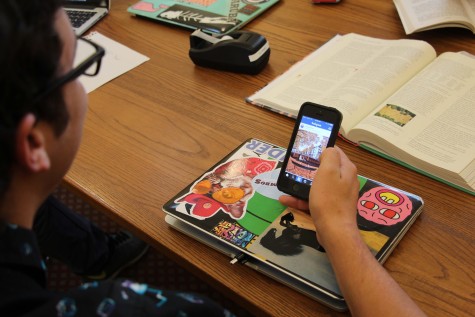
Senior Nick Gutfleish, frequent social media user, scrolls through his Instagram news feed as he takes a break from studying in the library.

